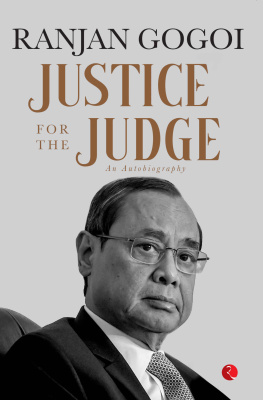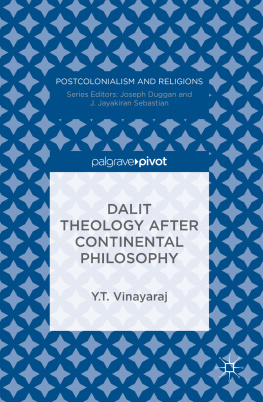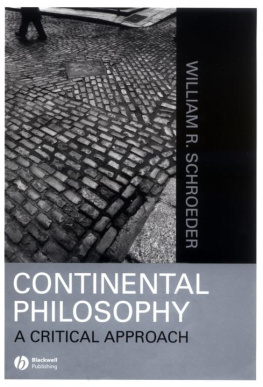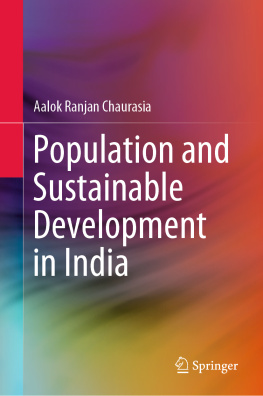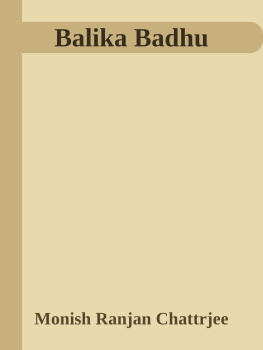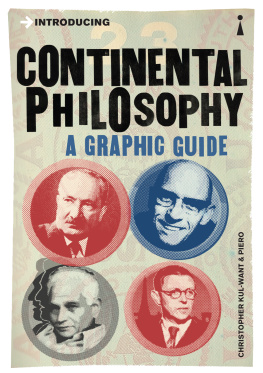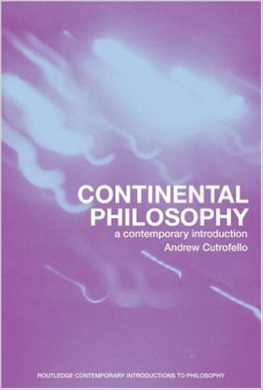Ranjan Ghosh - Philosophy and Poetry: Continental Perspectives
Here you can read online Ranjan Ghosh - Philosophy and Poetry: Continental Perspectives full text of the book (entire story) in english for free. Download pdf and epub, get meaning, cover and reviews about this ebook. year: 2019, publisher: Columbia University Press, genre: Romance novel. Description of the work, (preface) as well as reviews are available. Best literature library LitArk.com created for fans of good reading and offers a wide selection of genres:
Romance novel
Science fiction
Adventure
Detective
Science
History
Home and family
Prose
Art
Politics
Computer
Non-fiction
Religion
Business
Children
Humor
Choose a favorite category and find really read worthwhile books. Enjoy immersion in the world of imagination, feel the emotions of the characters or learn something new for yourself, make an fascinating discovery.

- Book:Philosophy and Poetry: Continental Perspectives
- Author:
- Publisher:Columbia University Press
- Genre:
- Year:2019
- Rating:3 / 5
- Favourites:Add to favourites
- Your mark:
- 60
- 1
- 2
- 3
- 4
- 5
Philosophy and Poetry: Continental Perspectives: summary, description and annotation
We offer to read an annotation, description, summary or preface (depends on what the author of the book "Philosophy and Poetry: Continental Perspectives" wrote himself). If you haven't found the necessary information about the book — write in the comments, we will try to find it.
Ranjan Ghosh: author's other books
Who wrote Philosophy and Poetry: Continental Perspectives? Find out the surname, the name of the author of the book and a list of all author's works by series.
Philosophy and Poetry: Continental Perspectives — read online for free the complete book (whole text) full work
Below is the text of the book, divided by pages. System saving the place of the last page read, allows you to conveniently read the book "Philosophy and Poetry: Continental Perspectives" online for free, without having to search again every time where you left off. Put a bookmark, and you can go to the page where you finished reading at any time.
Font size:
Interval:
Bookmark:
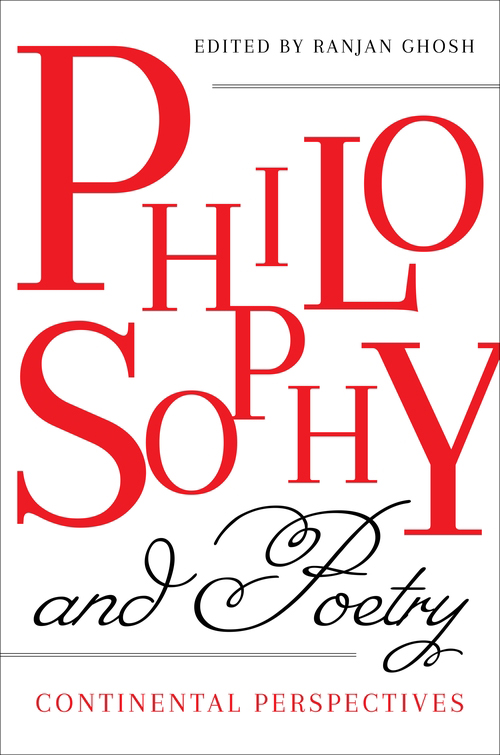
Philosophy and Poetry
Philosophy and Poetry
Continental Perspectives
Edited by Ranjan Ghosh
Columbia University Press
New York
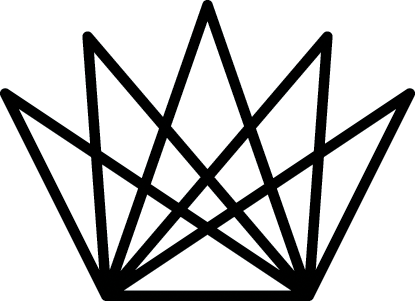
Columbia University Press
Publishers Since 1893
New York Chichester, West Sussex
cup.columbia.edu
Copyright 2019 Columbia University Press
All rights reserved
E-ISBN 978-0-231-54724-6
Library of Congress Cataloging-in-Publication Data
Names: Ghosh, Ranjan, editor.
Title: Philosophy and poetry : continental perspectives / edited by Ranjan Ghosh.
Description: New York : Columbia University Press, [2019] | Includes bibliographical references and index.
Identifiers: LCCN 2018048959 | ISBN 9780231187381 (cloth : alk. paper)
Subjects: LCSH: European poetry20th centuryHistory and criticism. | Philosophy, European20th century.
Classification: LCC PN1271 .P48 2019 | DDC 821/.9209dc 3
LC record available at https://lccn.loc.gov/2018048959
A Columbia University Press E-book.
CUP would be pleased to hear about your reading experience with this e-book at .
Cover design: Catherine Casalino
Contents
Ranjan Ghosh
Georges Van Den Abbeele
Lutz Koepnick
Roland V gs
Cecilia Sj holm
James Risser
Jean-Michel Rabat
Thomas H. Ford
Francois Noudelmann
Raoul Moati
Daniel Rosenberg Nutters and Daniel T. OHara
Galen Johnson
Claire Colebrook
Anne Emmanuelle Berger
Leslie Hill
Bruno Bosteels
Ian James
Jean-Philippe Deranty
Carol Mastrangelo Bov
Justin Clemens
RANJAN GHOSH
If we divorced poetry and philosophy altogether, we should bring a serious impeachment.
T. S. Eliot, Dante
Within philosophy resides the perennial temptation of the poetic, either to be made welcome or to be rejected.
George Steiner, The Poetry of Thought
T he quarrel begins
Jacques Maritain observes that Henri Bergson liked to quote a sentence he found in the letters of a French philosopher; the sentence was as follows: I have suffered from this friend enough to know him. When I know a friend to the corenot through having submitted him to a complete series of psychological tests, but because I have suffered from him and have got in myself the habit of his naturethen we may say in philosophical language that I know this man by connaturality. The lovers quarrel then, as it opens unto the twentieth century in this book, is certainly more complicated and productive than what Socrates meant in the Republic .
Let us, however, begin with Plato, who inevitably is our first point of dialogue. His Apology arraigns the poet on the grounds of not composing out of sophia or philesis , which the philosophers possess. Creation effected merely out of the base nature ( phusis ) and enthousiasmos is not exactly the Socratic recipethe Socratic dismissiveness of poetry So the soul of the city has the guardians who would know what excellence (see Meno ) is and the poets for whom epithumos would lead to eros and not philia or episteme . The diet of poetry needs to endorse its passional and recognitive validity through tests of excellence, intellective reason, and conceptual clarity. If poetry chose character and the human, then philosophy chose the abstract and the concept.
Susan Levins observations are perceptive:
While Plato rejects the view that poets are authorities in the sphere of pedagogy, denying thereby that poetry could be a techne even under ideal conditions, he admits the possibility that gifted practitioners, if themselves properly educated, may benefit the state by generating creations that will be suitable for the young. Although the pedagogical function of poetry is limited to children, poetic compositions will, in addition, play a civic role on a range of public occasions. Plato thus wins for philosophy the quarrel ( diaphora ) between it and poetry by arguing, against tradition, that philosophy should be the teacher of adults and hence supplant poetry in this way as the educator of Greece. He establishes philosophys dominance, in addition, by contending that its practitioners should be the ultimate arbiters of the content and form of acceptable poetic compositions. The interpretation developed here foregrounds the complexity of Platos attitude by stressing that although much is at stake for him in the conduct and outcome of the diaphora between philosophy and poetry, he is nevertheless unwilling to bar poetry from the ideal polis if this exclusion would deprive it of a potential benefactor.
Both Aristotle and Plato lived and grew up in a culture deeply grounded in poetry. Platos ambivalence can be traced to the decline of Greek poetry after the fourth century BC when poetry lost its moral and aesthetic power to a kind of crass materialization. The Socratic dialectic and its discriminating fineness look into poetry as speaking about a world and philosophy as interrogation into the workings of the worldthe reason, the judgments, and sources. If the poet speaks about a moral world, the philosopher generally starts on morality. It was Socrates who drew Plato away from his initial vocation as a poet into the pathways of philosophy. But was Plato really spurning poetry or reorienting poetry into the service of philosophy? My dear Socrates, Diotima says in the Symposium , if a mans life is ever worth living it is when he has attained this vision of the very soul of beauty. It is only when he discerns beauty itself through what makes it visible that a man will be quickened with the true, and not the seeming, virtuefor it is virtues self that quickens them, not virtues semblance. Plato has his own distinct mode of doing philosophyin dialogues that have rigor, clarity, and insight, the fierceness of insight with some uncertainty over inferences justifying the necessity of a dialogic mode. But is Platos philosophy steeped in poetry, his style a mediatory point between prose and poetry? What made Aristotle imply that the Socratic Conversations, as much as the prose-mimes of Sophron and Xenarchus, can be categorized as poetry? In this context, Hartland-Swans observations are worthwhile:
The Dialogues are works of art; dramatic to a varying extent; compact of serious argument, scientific and mythical description, sustained pleading, high incantation; enlivened by humorous incidents, quotations from the poets, topical allusions, playful digressionsall these diverse elements combining to develop a series of philosophical themes. And conversely it is these philosophical themes which orient and control the variegated discussions in each Dialogue. The language itself fluctuates between extremes of fine-spun or even laboured prosaic argumentation, and colourful or metaphorical descriptions of high poetic quality. And it is, naturally enough, in the Myths, allegories and fables that this poetic quality is longest sustained, and that Platos imaginative genius most openly displays itself. Not only are we aware that poetry rather than fine prose is the more correct description, but we can feel the presence of emotional currents which seem, for the moment, to change the whole atmosphere of the Dialogue.
In fact, the poetic Platos objection to bad poetry is legitimate. Poetry must come with perception for it is what connects and negotiates with philosophy. The poeticization of the dialogues comes about through the urgency of perception, the necessity to challenge the vulgarization of abstraction. In fact, even Aristotle wrote poetry much to the surprise of people who see him only as the foremost philosopher in the ancient world. He composed enough poetry to ll two papyrus rolls in the ancient collections of his works, for it was not unusual that a well-educated gentleman of his day should be able to come up with a verse or song to grace special occasions. What is very surprising is the story told about one of his poems, for the sources that preserve the text also tell us that it came near to costing the philosopher his life. Aristotles socioepistemic consternation about the poets is less intense than Platos, which, however, does not prevent him from putting forth the exhortations for the creation of epic and tragedy. Intertwining poetry with ethicsthe overlaps between Politics and Poetics are hard to ignoreAristotle sees poetry supervised by philosophy through judgment, choice, and values. For a man with a variety of interests in life-experiences and forms of reality, his philosophical aesthetics combined wonder and practicality, structure and good action. Not as suspecting of poetic mimesis as Plato was, Aristotle reserves the significance of emotional effects in the construction of virtuous habits befitting particular occasions (cf. Nicomachean Ethics , Poetics , and Politics ). Expanding the scope and scale of mimesis meant an acknowledgment of poetrys groundedness in human nature, its reach, and its cultivation of techne to produce a wide and wise connect between emotion and poetry. The circle of interest, the depth of analysis, and the politics of the universals bring the philosopher and the poet into an agonistic negotiation. Poetry and philosophy connect on the working out and dynamics of wonderthe wonder as allowing the poet sense-making outside the familiar trend of occurrences and also as making room for the philosopher to inspire a sense-experience, a beyond-the-event investigation into the foundations of occurrences. They intersect with conflicting levels of profit on the use and sense of words: the poets words can be the philosophers tool, codes, and modes of reflection and judgment, of contemplation and enunciation. If Keats says Beauty is Truth, Truth Beauty, the philosopher for once forgets the poem and questions the validity and ramifications of such a beauty-truth juxtaposition or contraposition. The poet (p)resides an experience, the philosopher decides.
Font size:
Interval:
Bookmark:
Similar books «Philosophy and Poetry: Continental Perspectives»
Look at similar books to Philosophy and Poetry: Continental Perspectives. We have selected literature similar in name and meaning in the hope of providing readers with more options to find new, interesting, not yet read works.
Discussion, reviews of the book Philosophy and Poetry: Continental Perspectives and just readers' own opinions. Leave your comments, write what you think about the work, its meaning or the main characters. Specify what exactly you liked and what you didn't like, and why you think so.

